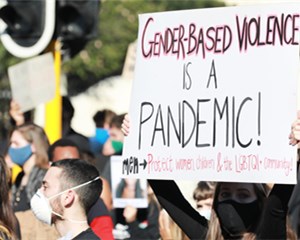She then listed hunger, scurvy and the thousands of workers killed in the factories without attracting the attention of the statisticians. "Quiet conditions" is a key phrase – she is referring to the skill with which capital cloaks its crimes.
然后,她在沒有引起統計人員注意的情況下,列出了饑餓、壞血病和數千名工人在工廠被殺的情況。“安靜的環境”是一個關鍵短語——她指的是首都掩蓋其罪行的技巧。
In January 2019, Conservative ministers in the UK recommended that grant allocations to local authorities no longer be weighted to reflect the higher costs of deprivation and poverty, with the result that money could be redirected to the more affluent Tory shires (a move variously described as a "brutal political stitch-up" and "an act of war"). These moments of violence move silently, as do the women today who are so often the most affected: threatened by Brexit with the loss of equality and human rights protection, including employment rights and funding for women's services (notably in relation to sexual violence, where the number of rapes reported to police in England and Wales doubled between 2013 and 2018, while prosecutions fell), or forced into sex work as a result of the universal credit system, part of a Conservative overhaul of benefits for people on low household income that is now acknowledged as catastrophic for the most socially vulnerable.
2019年1月,英國保守黨部長們建議,對地方政府的撥款不再被加權以反映貧困和貧困帶來的更高成本,其結果是資金可能會重新流向更富裕的保守黨郡(此舉被描述為“野蠻的政治縫補”和“戰爭行為”)。這些暴力事件悄無聲息地發生,就像今天受影響最嚴重的女性一樣:受英國脫歐的威脅,女性將失去平等和人權保護,包括就業權利和為女性服務提供資金(尤其在性暴力方面,2013年至2018年,英格蘭和威爾士向警方報案的強奸案數量翻了一番,而起訴案件卻有所下降)。或者因為普遍的信用體系而被迫從事性工作,這本是保守派對低收入人群福利改革的一部分,現在人們卻認為這對社會上最脆弱的人來說是災難性的。
When Iain Duncan Smith, the architect of the policy, was knighted in the 2020 new year honours list, 237,000 people signed a petition objecting to the award for a man "responsible for some of the cruellest, most extreme welfare reforms this country has ever seen". The Department for Work and Pensions denies any link between the new credit system and survival sex, dismissing the tales of women as anecdotal.
當該政策的設計者伊恩·鄧肯·史密斯在2020年新年授勛名單上被授予爵位時,23.7萬人簽署了一份請愿書,反對將爵位授予“實施了這個國家有史以來最殘酷、最極端的福利改革”的人。英國就業和養老金部門否認新信貸體系與生存性行為之間有任何聯系,并將女性的故事視為軼事。

It is generally recognised that the spending "free-for-all" inaugurated by Boris Johnson after his 2019 election victory was intended to secure a further electoral term, but will have no effect on the basic gulf between the rich and the dispossessed (the moneys released for the NHS are a fraction of what is needed). Nor is there any confidence that the flurry of NHS spending brought on a year later by the pandemic will be significantly sustained. To general outcry, the promised NHS pay rise for nurses has turned out to be a derisory 1%.
人們普遍認為鮑里斯·約翰遜在2019年大選獲勝后發起的“全民免費”支出計劃意在確保他的下一屆選舉任期,但對富人和被剝奪者之間的基本鴻溝沒有任何影響(發放給NHS的資金只是所需資金的一小部分)。在“一年后大流行帶來的NHS大量支出將得到顯著持續”這一點上也無任何信心。在公眾的強烈抗議下,NHS承諾的護士工資的增長僅為可笑的1%。
Male violence is the standout feature of the day, but it is also central to my argument that the masculinity enjoined on all men, and paraded by so many, is a fraud. On this, I take my distance from radical feminism, notably that of the influential school of Catharine MacKinnon and Andrea Dworkin, which sees violence as the unadulterated and never-failing expression of male sexuality and power – a self-defeating argument if ever there was one (if true, then men will rule the world for ever). Instead, it is crucial for me that, even while calling out masculinity in its worst guise, we allow to individual men the potential gap between maleness and the infinite complexity of the human mind.
男性暴力是這一時期的突出特征,但我的中心論點還在于,許多人炫耀的強加于所有男人的男子氣概是一種騙局。在這一點上我與激進女權主義保持距離,尤其是凱瑟琳·麥金農和安德里亞·德沃金這一頗具影響力的流派,她們將暴力視為男性性欲和權力的純粹和永不褪色的表達方式——如果真有這樣的論點的話,那就是弄巧成拙(如果是真的,那么男人將永遠統治世界)。相反,對我來說至關重要的是,即使在呼喚最壞的男子氣概的同時,我們允許個體的男人在男性和無限復雜的人類思想之間存在潛在的差距。











